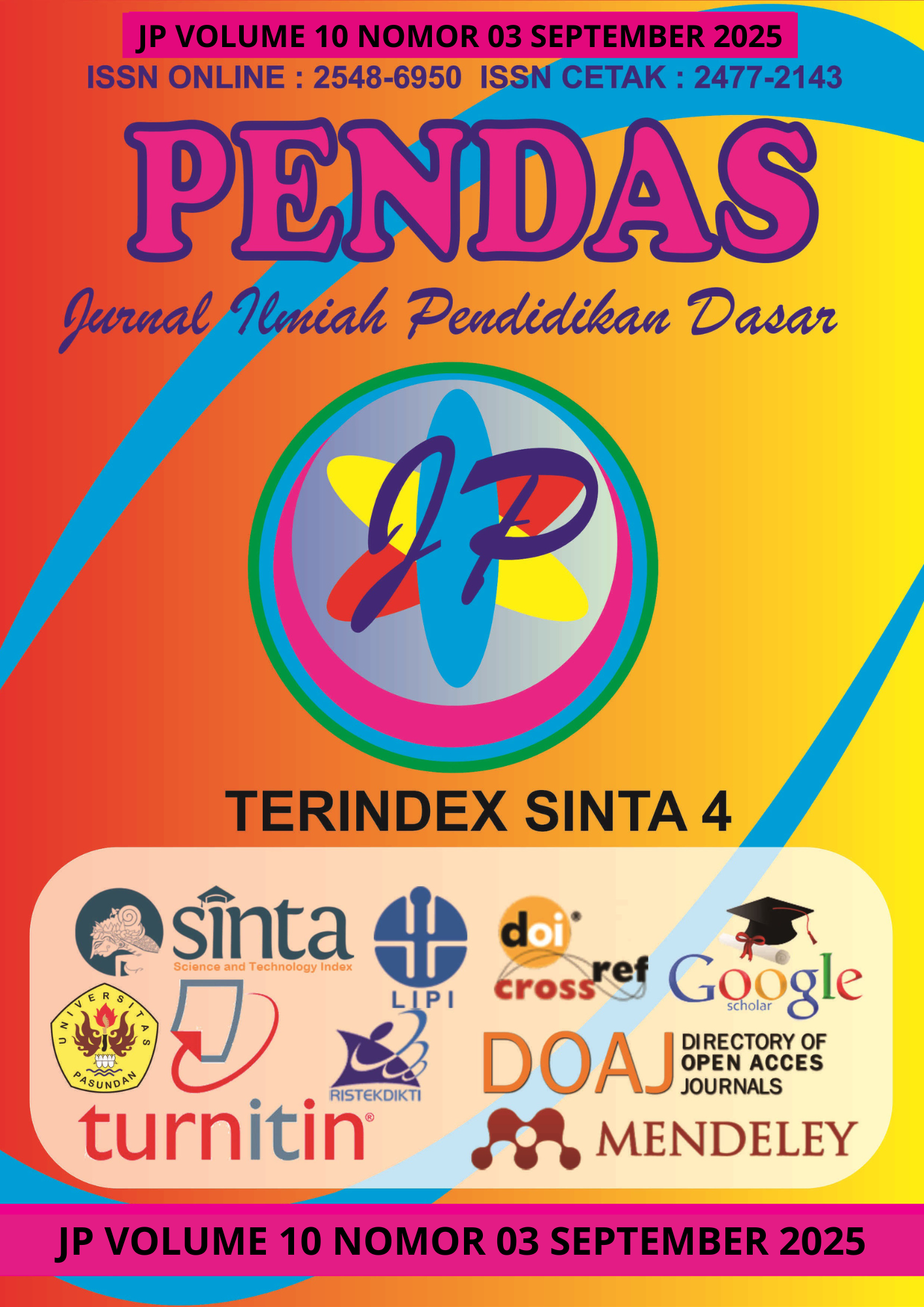Penggunan Model Pembelajaran Problem Based Learning (PBL) Untuk Meningkatkan Hasil Belajar IPA Konsep Gaya Pada Siswa Kelas IV Kristen Patti
Indonesia
DOI:
https://doi.org/10.23969/jp.v10i03.33815Keywords:
Problem Based Learning, Learning Outcomes, ScienceAbstract
This study aims to determine the effect of using the Problem Based Learning (PBL) model in improving students' learning outcomes in the science concept of force for fourth-grade students at SD Kristen Patti. The research employed Classroom Action Research (CAR) methodology with 19 students as the subjects. Data were collected through learning outcome tests and observation sheets on teacher and student activities during the learning process. The research procedure consisted of two cycles including planning, action implementation, observation, and reflection. The results showed that the application of the Problem Based Learning model could improve students' learning outcomes in the science concept of force. This is evidenced by the increasing average test scores from the initial condition of only 51.11%, rising to 71.29% in cycle I, and reaching 78.52% in cycle II. Furthermore, the students' classical completeness also improved significantly in each cycle, with all students in cycle II achieving completeness according to the Minimum Mastery Criteria (KKM) of 60. The application of this model also enhanced students' activeness and involvement in the learning process through group discussions and practicum activities. Based on these results, it can be concluded that the Problem Based Learning model is effective in improving learning outcomes of the science force concept for fourth-grade students at SD Kristen Patti.
Downloads
References
Artawan, I. K. A. S., Rati, N. W., & Pajarastuti, D. P. (2021). Penerapan Model Pembelajaran Problem Based Learning untuk Meningkatkan Hasil Belajar IPA Siswa Sekolah Dasar. Jurnal Ilmiah Pendidikan Profesi Guru, 4(2), 173–181. https://doi.org/10.23887/jippg.v4i2.35582
Asyafah, A. (2019). MENIMBANG MODEL PEMBELAJARAN (Kajian Teoretis-Kritis atas Model Pembelajaran dalam Pendidikan Islam). TARBAWY : Indonesian Journal of Islamic Education, 6(1), 19–32. https://doi.org/10.17509/t.v6i1.20569
BP, A. R., Munandar, S. A., Fitriani, A., Karlina, Y., & Yumriani. (2022). Pengertian Pendidikan, Ilmu Pendidikan dan Unsur-Unsur Pendidikan. Al-Urwatul Wutsqa: Kajian Pendidikan Islam, 2(1), 1–8.
Kasingku, J. D., & Gosal, F. (2024). Pendidikan Holistik Sebagai Dasar Pembentukan Karakter. Pendas : Jurnal Ilmiah Pendidikan Dasar, 9(2). https://doi.org/10.23969/jp.v9i2.15877
Kristiana, T. F., & Radia, E. H. (2021). Meta analisis penerapan model problem based learning dalam meningkatkan hasil belajar IPA siswa Sekolah Dasar. Jurnal Basicedu, 5(2), 466–467. https://journal.uii.ac.id/ajie/article/view/971
Rieschka, M. N. (2020). Problem Based Learning Pada Pembelajaran IPA Di Sekolah Dasar. Social, Humanities, and Educational Studies (SHEs): Conference Series, 3(3), 1499–1505. https://jurnal.uns.ac.id/shes
Romadhoni, K., Hasanah, K., & Adi, P. (2023). PENERAPAN MODEL PEMBELAJARAN PROBLEM BASED LEARNING (PBL) UNTUK MENINGKATKAN HASIL BELAJAR PESERTA DIDIK PADA MATERI SIKLUS AIR KELAS 5 SEKOLAH DASAR. Pendas : Jurnal Ilmiah Pendidikan Dasar, 08(01).
Sipahutar, C. (2022). PENERAPAN MODEL PEMBELAJARAN PROBLEM BASED LEARNING (PBL) DALAM BLENDED LEARNING UNTUK MENINGKATKAN KEMAMPUAN KOLABORASI, KETERAMPILAN BERPIKIR KRITIS, DAN PENGUASAAN KONSEP MATEMATIKA KELAS IV SEKOLAH DASAR XYZ JAKARTA. Pendas : Jurnal Ilmiah Pendidikan Dasar, 7(2).
Tibahary, A. R., & Muliana, M. (2018). Model-Model Pembelajaran Inovatif. Scolae: Journal of Pedagogy, 1(1), 54–64. https://doi.org/10.56488/scolae.v1i1.12
Downloads
Published
Issue
Section
License
Copyright (c) 2025 Pendas : Jurnal Ilmiah Pendidikan Dasar

This work is licensed under a Creative Commons Attribution 4.0 International License.














































